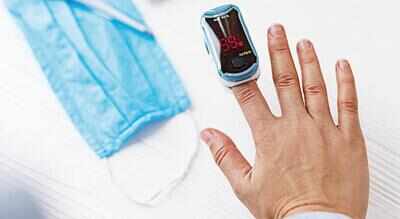Top Searches
- News
- City News
- delhi News
- New at-home norms put in place in Delhi

The revised guidelines state that the decision to administer remdesivir or any other investigational therapy must be taken by a medical professional
NEW DELHI: Days after the Centre issued revised guidelines for home isolation of mild/asymptomatic Covid-19 cases, Delhi government on Tuesday ordered their implementation in all districts. In a circular issued by directorate general of health services, the districts have been directed to ensure that every patient in home isolation has a pulse oximeter.
“Records pertaining to the distribution of pulse oximeters are to be maintained by every district. The same is to be shared with the authorities concerned daily,” added the circular.
The revised guidelines state that the decision to administer remdesivir or any other investigational therapy must be taken by a medical professional and administered only in a hospital setting.
“Do not attempt to procure or administer remdesivir at home. Also, systemic oral steroids are not indicated in mild disease. If symptoms persist beyond seven days (persistent fever, worsening cough, etc) consult the treating doctor for treatment with low dose oral steroids. In case of falling oxygen saturation or shortness of breath, seek immediate consultation of the treating physician/surveillance team,” the guidelines mention.
Patients aged over 60 and those with co-morbid conditions, such as hypertension, diabetes, heart disease, chronic lung, liver or kidney disease, cerebro-vascular disease, etc would only be allowed home isolation after proper evaluation by the treating medical officer. Patients suffering from immunocompromised status (HIV, transplant recipients, cancer, etc) have not been recommended for home isolation.
For those in home isolation, regular monitoring of health should be done by the caregivers or patient. “Immediate medical attention must be sought if serious signs or symptoms develop. These could include difficulty in breathing, dip in oxygen saturation (SpO2 <94% at room air), persistent pain or pressure in the chest and mental confusion,” said the circular.
Such patients would stand discharged and isolation would end after at least 10 days have passed from onset of symptoms or from date of sampling for asymptomatic cases and no fever for three days. There is no need for testing after the home isolation period is over.
“Patients may perform warm water gargles or take steam inhalation twice a day. If fever is not controlled with the maximum dose of paracetamol 650mg four times a day, consult the doctor, who may consider advising other drugs like naproxen 250mg twice a day. Taking ivermectin tablet (200 mcg/kg) once a day on an empty stomach for 3-5 days should be considered. Budesonide via inhalers at a dose of 800 mcg twice daily for 5-7 days may be given if symptoms stay beyond five days,” it said.
“Records pertaining to the distribution of pulse oximeters are to be maintained by every district. The same is to be shared with the authorities concerned daily,” added the circular.
The revised guidelines state that the decision to administer remdesivir or any other investigational therapy must be taken by a medical professional and administered only in a hospital setting.
“Do not attempt to procure or administer remdesivir at home. Also, systemic oral steroids are not indicated in mild disease. If symptoms persist beyond seven days (persistent fever, worsening cough, etc) consult the treating doctor for treatment with low dose oral steroids. In case of falling oxygen saturation or shortness of breath, seek immediate consultation of the treating physician/surveillance team,” the guidelines mention.
Patients aged over 60 and those with co-morbid conditions, such as hypertension, diabetes, heart disease, chronic lung, liver or kidney disease, cerebro-vascular disease, etc would only be allowed home isolation after proper evaluation by the treating medical officer. Patients suffering from immunocompromised status (HIV, transplant recipients, cancer, etc) have not been recommended for home isolation.
For those in home isolation, regular monitoring of health should be done by the caregivers or patient. “Immediate medical attention must be sought if serious signs or symptoms develop. These could include difficulty in breathing, dip in oxygen saturation (SpO2 <94% at room air), persistent pain or pressure in the chest and mental confusion,” said the circular.
Such patients would stand discharged and isolation would end after at least 10 days have passed from onset of symptoms or from date of sampling for asymptomatic cases and no fever for three days. There is no need for testing after the home isolation period is over.
“Patients may perform warm water gargles or take steam inhalation twice a day. If fever is not controlled with the maximum dose of paracetamol 650mg four times a day, consult the doctor, who may consider advising other drugs like naproxen 250mg twice a day. Taking ivermectin tablet (200 mcg/kg) once a day on an empty stomach for 3-5 days should be considered. Budesonide via inhalers at a dose of 800 mcg twice daily for 5-7 days may be given if symptoms stay beyond five days,” it said.
FacebookTwitterLinkedinEMail
Start a Conversation
end of article
Top Stories Right Now
- indiaCovid live: All-time high of 4529 new deaths; cases 2.67 lakh
- indiaVaccine tourism: 24 days in Russia, 2 Sputnik V shots for Rs 1.3 lakh
- indiaCovid-19 cases in less than 2% of population, 98% still vulnerable, says govt
- sportsBCCI still negotiating soft quarantine for Indian cricketers in England
- cityKarnataka overtakes Delhi, has 2nd highest Covid toll
